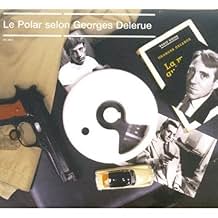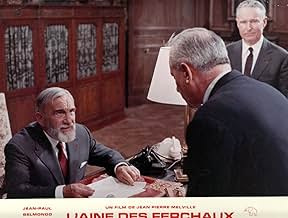L'aîné des Ferchaux
- 1963
- Tous publics
- 1h 42min
NOTE IMDb
6,5/10
1,9 k
MA NOTE
L'ex-parachutiste français en faillite devenu boxeur amateur Michel Maudet devient le garde du corps du banquier corrompu fugitif Ferchaux.L'ex-parachutiste français en faillite devenu boxeur amateur Michel Maudet devient le garde du corps du banquier corrompu fugitif Ferchaux.L'ex-parachutiste français en faillite devenu boxeur amateur Michel Maudet devient le garde du corps du banquier corrompu fugitif Ferchaux.
Malvina Silberberg
- Lina
- (as Malvina)
Barbara Sommers
- Lou's friend
- (as Barbara Somers)
Maurice Auzel
- Boxeur
- (non crédité)
Charles Bayard
- Un administrateur
- (non crédité)
Pierre Leproux
- Un administrateur
- (non crédité)
Histoire
Le saviez-vous
- AnecdotesDuring the shooting of this film, the director Jean-Pierre Melville had no respect for Charles Vanel and treated him badly on set. Actor Jean-Paul Belmondo got so mad at Melville that he slapped him on set.
- Citations
[first lines]
Michel Maudet: My name is Michel Maudet. I guess. Back then, I was a boxer. Or more precisely, trying to become one.
- ConnexionsFeatured in Voyage à travers le cinéma français (2016)
Commentaire à la une
I must confess I was terribly excited at the prospect of Jean-Pierre Melville tackling the road movie. If a director was ever suitable for taking on his back the existential baggage usually associated with that particular sub-genre, that's old Jean-Pierre. But in the same time, nine out of ten times there's a reason why certain films of a director's ouevre receive all the plaudits while others tend to languish in obscurity. Simply put, Magnet of Doom is not among Melville's finest - probably not his worst either. It's just too awkward and clumsy to ever be truly successful from an artistic or technical standpoint and even though fans of the director will take pleasure in witnessing the early nurturing of those same ideas, themes and moods that would later transform into what became his signature style, Magnet of Doom lacks the singularity of purpose and stylistic confidence of something like Le Samourai.
Melville weaves the plots of two characters, an amateur boxer scraping to get by after his boxing career goes down the drain and the stalwart, rich businessman on the run from the law (presumably for someone's murder) who hires the first as his secretary and travel companion, into a road movie that takes us all the way from the petit bourgouisie cafes of France to Manhattan to the Deep South and bayous of New Orleans. If you can forgive the wooden delivery and stilted dialogue American non-actors are saddled with, the choppy editing, the occasionally clumsy and haphazard camera-work, there's quite a few things to appreciate. Melville's guerilla tactics as he samples New Orleans nightlife with a camera shooting from the open car of a moving vehicle, the documentary style of his footage of empty highway stretches, slick diners, smoky bars and neon motel signs, small parts of a puzzle that in clicking together form a different kind of Americana. One seen through the eyes of a European not necessarily fascinated with what he sees. If the boxer's fixation on Frank Sinatra, the son of Italian immigrants much like himself, symbolizes the mythic quality of the New World, a motley assortment of thieving hitchhikers, soldiers spouting racial slurs and opportunist, murderous bar owners reveals the seemy underbelly of the American Dream.
Behind the slow-burn atmosphere however, behind the minimalism of the plot, the sparse dialogue, the intimacy of the monologues, all typically Melvillesque ideas and themes that would later resurface in a more refined, surefooted form, there's not much of a story to speak of. Not only is the plot stretched pretty thin, not only does it suffer from one too many improbabilities (not plot holes necessarily but little distractions that accumulate in the course of time) but it's handled in a somewhat awkward manner. The gradual shift of power in the duo's relationship, as one learns to experience freedom and the other comes to term with solitude, is not enough to carry the dramatic weight of the plot and beyond that there's not much of anything. And if Belmondo's character redeems himself in the finale for being a conniving, self-serving scoundrel for most of the film, he has the show stole from right under his nose by by the great Charles Vanel (Les Diaboliques, Wages of Fear, To Catch a Thief) who gives another terrific performance.
Melville weaves the plots of two characters, an amateur boxer scraping to get by after his boxing career goes down the drain and the stalwart, rich businessman on the run from the law (presumably for someone's murder) who hires the first as his secretary and travel companion, into a road movie that takes us all the way from the petit bourgouisie cafes of France to Manhattan to the Deep South and bayous of New Orleans. If you can forgive the wooden delivery and stilted dialogue American non-actors are saddled with, the choppy editing, the occasionally clumsy and haphazard camera-work, there's quite a few things to appreciate. Melville's guerilla tactics as he samples New Orleans nightlife with a camera shooting from the open car of a moving vehicle, the documentary style of his footage of empty highway stretches, slick diners, smoky bars and neon motel signs, small parts of a puzzle that in clicking together form a different kind of Americana. One seen through the eyes of a European not necessarily fascinated with what he sees. If the boxer's fixation on Frank Sinatra, the son of Italian immigrants much like himself, symbolizes the mythic quality of the New World, a motley assortment of thieving hitchhikers, soldiers spouting racial slurs and opportunist, murderous bar owners reveals the seemy underbelly of the American Dream.
Behind the slow-burn atmosphere however, behind the minimalism of the plot, the sparse dialogue, the intimacy of the monologues, all typically Melvillesque ideas and themes that would later resurface in a more refined, surefooted form, there's not much of a story to speak of. Not only is the plot stretched pretty thin, not only does it suffer from one too many improbabilities (not plot holes necessarily but little distractions that accumulate in the course of time) but it's handled in a somewhat awkward manner. The gradual shift of power in the duo's relationship, as one learns to experience freedom and the other comes to term with solitude, is not enough to carry the dramatic weight of the plot and beyond that there's not much of anything. And if Belmondo's character redeems himself in the finale for being a conniving, self-serving scoundrel for most of the film, he has the show stole from right under his nose by by the great Charles Vanel (Les Diaboliques, Wages of Fear, To Catch a Thief) who gives another terrific performance.
- chaos-rampant
- 1 avr. 2009
- Permalien
Meilleurs choix
Connectez-vous pour évaluer et suivre la liste de favoris afin de recevoir des recommandations personnalisées
- How long is Magnet of Doom?Alimenté par Alexa
Détails
- Date de sortie
- Pays d’origine
- Langues
- Aussi connu sous le nom de
- Magnet of Doom
- Lieux de tournage
- Sociétés de production
- Voir plus de crédits d'entreprise sur IMDbPro
- Durée1 heure 42 minutes
- Mixage
- Rapport de forme
- 2.35 : 1
Contribuer à cette page
Suggérer une modification ou ajouter du contenu manquant

Lacune principale
By what name was L'aîné des Ferchaux (1963) officially released in India in English?
Répondre























